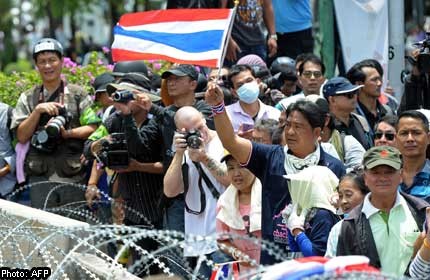Protesters mass outside Thai parliament

BANGKOK - Around 2,000 Thai anti-government demonstrators converged near parliament Wednesday in an opposition-led rally against a controversial bill offering amnesty for political violence in the divided nation.
Hundreds of riot police carrying shields and batons barricaded the approaches to the legislature with concrete blocks and barbed wire to stop demonstrators reaching the building in the historic area of Bangkok.
The government of Prime Minister Yingluck Shinawatra has been braced for several days for the rally.
The demonstration raised fears of fresh unrest in the politically-turbulent country as parliament begins to debate the amnesty proposals on Wednesday afternoon.
Opposition Democrat lawmakers, including the former prime minister and current party leader Abhisit Vejjajiva, led supporters to the barricades some 200 metres from the legislature gates.
After a stand-off police said they would allow only lawmakers through to parliament, prompting a plea from Democrat leaders for the protesters to disperse.
But an AFP reporter at the scene said people remained in the area, with some 50 of them trying to push through the blockade.
Before entering parliament Abhisit praised the marchers' resolve but urged them to stand down.
"We cannot rush this fight which will be long... so we must be prudent," he said.
The former premier also accused the government of attempting to "whitewash" human rights abuses by backing the amnesty bill.
The proposed amnesty would scrap charges against those involved in political unrest between the time of the military coup that toppled then-prime minister Thaksin Shinawatra in September 2006 until May 2012.
Leaders would be excluded .
Anti-government factions fear it will be manipulated by the ruling Puea Thai government to waive convictions against Thaksin, who is Yingluck's brother.
"I came here for justice. I don't want an illegitimate bill," said 55-year-old protester Prapas Sunantapreeda.
Thailand has been riven by political tensions since the overthrow of Thaksin, who lives abroad but still attracts the loyalty of the kingdom's poor, rural working class.
The United Nations on Tuesday urged Yingluck's government to ensure that any amnesty "excludes those who are responsible for human rights violations", including during deadly political violence in 2010.
Two months of pro-Thaksin "Red Shirt" protests against Abhisit's government brought much of Bangkok to a standstill and culminated in a bloody military crackdown three years ago. Some 90 people were killed in the unrest, with around 1,900 injured.
Abhisit is facing murder charges in connection with the crackdown. No military officials have been prosecuted.
Mass demonstrations, often involving bloodshed, have become a recurrent feature of Thailand's politics in recent years, with ultra-royalist nationalist "Yellow Shirts" and their "Red Shirt" foes both taking to the streets.
An attempt to introduce an amnesty bill last year was aborted after Yellow Shirts and ultra-nationalists - who support the Democrat Party - rallied outside the legislature.
Yellows have proven to be a powerful street force in the past, drawing on support from Bangkok's elite and elements in the military. They helped unseat Thaksin and claimed the scalps of two allied governments in under five years.
Their rallies in 2008 paralysed Bangkok's main airports, stranding thousands of tourists. But more recently they have struggled to draw large numbers to the streets.
The Democrats have not won a Thai election in two decades, but were installed in government with Abhisit at the helm in 2008 after a parliamentary vote unseated the Thaksin-allied ruling party.